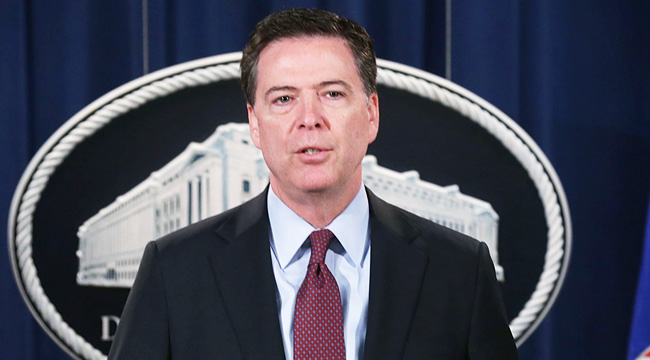
One week before President Trump fired James Comey, the FBI director admitted to feeling “mildly nauseous” over the idea that he helped Trump win the election. Comey made this statement, of course, during a Senate grilling over why he chose to (very publicly) reopen the investigation into Hillary Clinton’s emails a few weeks before the big day. The decision to do so may have pushed some voters who were on the line, and Comey may feel even more than pukey after a new report about a “bad” Russian intelligence document (surprise?) possibly swaying him at multiple investigation points.
The Washington Post reveals information from the supposed piece of Russian intel, which claimed to describe “a tacit understanding” between the Department of Justice and the Clinton campaign over her private email server. This document — which was either straight-up fake or mistaken — points the finger at Attorney General Loretta Lynch for this agreement (purportedly made partially by email), which led Comey to take action:
Current and former officials have said that document played a significant role in the July decision by then — FBI Director James B. Comey to announce on his own, without Justice Department involvement, that the investigation was over. That public announcement — in which he criticized Clinton and made extensive comments about the evidence — set in motion a chain of other FBI moves that Democrats now say helped Trump win the presidential election.
But according to the FBI’s own assessment, the document was bad intelligence — and according to people familiar with its contents, possibly even a fake sent to confuse the bureau. The Americans mentioned in the Russian document insist they do not know each other, do not speak to each other and never had any conversations remotely like the ones described in the document.
By August, the FBI determined that this Russian intel document was “unreliable,” but Comey had already shut down the first leg of the Clinton email probe over fears that Lynch would do so. His reported reasoning was to show that the FBI “reached the decision independently” and without any political influence from the DOJ. Comey had also reportedly worried that this document would leak and mess up the whole investigation because it would look like the Clinton campaign was receiving DOJ favors. So, he held a press conference and lambasted Clinton for being “extremely careless” while handling classified information (and, on a less dramatic note, he said no charges would be brought against her).
Whether this chain of events somehow led to Comey reopening the probe in late October, we’ll never know. Yet the fact remains that at least part of the investigation into Clinton’s private email server was swayed by the “bad” Russian intel. And on a final note, the Washington Post emphasizes that Lynch had never (not even once) communicated with Amanda Renteria, the Clinton campaign staffer who supposedly received the tacit agreement.
(Via Washington Post)
